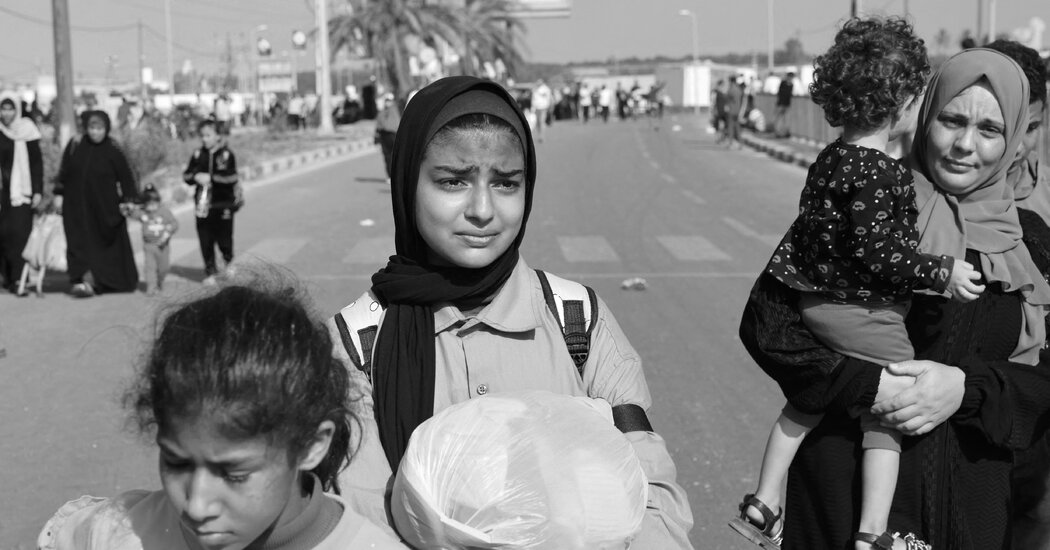The Matzav: The Judeo-Christian War, or the Israelis’ First Day of World War II. Amichai Friedman and the Gaza Strip
Israeli military operations have created an untenable humanitarian crisis, which will only worsen over time. The nation’s opponents argue that Israel is verging on ethnic cleansing or genocide.
The Israeli Ministry of Intelligence had a proposal to move the entire population of the Gaza Strip to the Egyptian-ruled Sinai Peninsula. Extreme right-wing elements in the government — also represented in the I.D.F. — celebrate the war as an opportunity to be rid of Palestinians altogether. There is a video that surfaced on social media of Capt. It was clear to a group of soldiers that this land is ours, the whole land, including Gaza, according to Amichai Friedman, a rabbi in the Nahal brigade. The troops cheered enthusiastically; the military said that his conduct “does not align” with its values and directives.
I used to drive my car fast from checkpoint to checkpoint, then tailing an Israeli Army vehicle on a road with fields burned to ash by rockets. The camp itself was a collection of concrete bunkers, with hundreds of shell casings from the pitched battles of Oct. 7 littering the pavement outside.
The lieutenant colonel has a face that looks a bit older than it is. When I met him, he was getting his soldiers ready for the ground invasion that would begin a few days later.
The situation in which Israelis find themselves is called the matzav. He lives in Tel Aviv, where his wife was trying to hold things together while schools were closed and the kids were home. But he was born in Nir Oz. He says one of his cousins is alive and well, having barricaded herself with her family for hours. I want to tell her to go back to her house. Two of his uncles and one of his best friends are being held against their will.
The issue of Israel’s IDPs gets short shrift in the news. But it’s central to the way in which Israelis perceive the war. There are now more than 150,000 Israelis — proportionately the equivalent of about 5.3 million Americans — who were forced out of their homes by the attacks of Oct. 7. Small cities like Sderot, near Gaza, and Kiryat Shmona, near Lebanon, are now mostly ghost towns and will remain that way if the government can’t secure its borders.
Should that happen, sizable parts of Israel’s already minuscule territory would become essentially uninhabitable. That, in turn, would mean the failure of the Jewish state to maintain a safe homeland, presaging the end of Zionism itself. Israelis think of this war as important and willing to give up their fury at Benjamin Netanyahu and his ministers for a while to win it.
Taken together, these statements could easily be construed as indicating a genocidal intent. But is genocide actually occurring? Israeli military commanders insist that they are trying to limit civilian casualties, and they attribute the large numbers of dead and wounded Palestinians to Hamas tactics of using civilians as human shields and placing their command centers under humanitarian structures like hospitals.
Still, the collective horror of what we are watching does not mean that a genocide, according to the international legal definition of the term, is already underway. Because genocide, sometimes called “the crime of all crimes,” is perceived by many to be the most extreme of all crimes, there is often an impulse to describe any instance of mass murder and massacre as genocide. The urge to label terrible events as genocide can obfuscate reality rather than explain it.
What we had warned about — that it would be impossible to ignore the occupation and oppression of millions for 56 years, and the siege of Gaza for 16 years, without consequences — exploded in our faces on Oct. 7. In the wake of Hamas’s massacre of innocent Jewish civilians, our group called on the Israeli government to stop killing innocent Palestinians in Gaza in response to the crisis. The only way to end the cycle of violence is to seek a political compromise with the Palestinians and end the occupation.
And so, while we cannot say that the military is explicitly targeting Palestinian civilians, functionally and rhetorically we may be watching an ethnic cleansing operation that could quickly devolve into genocide, as has happened more than once in the past.
If we truly believe that the Holocaust taught us a lesson about the need — or really, the duty — to preserve our own humanity and dignity by protecting those of others, this is the time to stand up and raise our voices, before Israel’s leadership plunges it and its neighbors into the abyss.
The United States Holocaust Memorial Museum in Washington DC and the Israel’s State Hermitage in Jerusalem must be at the forefront of warnings against war crimes, crimes against humanity and ethnic cleansing.
